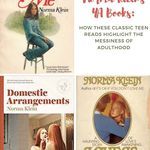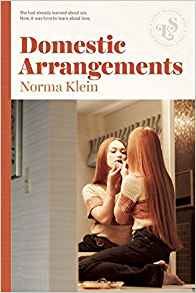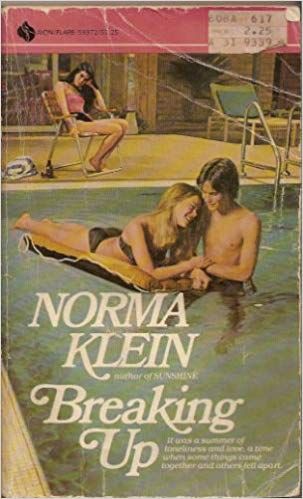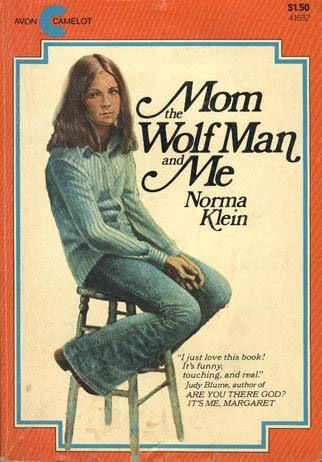This year’s project focused on the young adult fiction of Norma Klein, and the seven books I read became the basis for Hey YA: Extra Credit, a(n admittedly not so) short form podcast that dug into each of the books. Klein wrote books similar to the work of Judy Blume, pushing boundaries and digging into topics that were so often not approached with honesty and forthrightness for young readers in the 1970s and 1980s. I was a tween and a teen in the ’90s and early ’00s, a little bit outside the peak of Klein’s popularity with readers. I grew up reading Judy Blume, and it was her blurb on the cover of a Lizzie Skurnick reissue of Klein’s Domestic Arrangements that originally had me curious about the book, and Klein more broadly. It was such a mature read, even years past its reissue, and it felt right to give even more attention to Klein’s work. Many of those whose work I respect in the YA work—critics, enthusiasts, and authors alike—credit Klein for being a legacy in the field. Going into the project, I suspected I’d find something special. I also prepared myself to navigate the tricky space between nostalgia so many had for Klein’s books and the content that might be challenged by today’s standards. While the former was certainly true, particularly as it relates to fat phobia (every single one of the books I read detested fat people numerous times), what stood out to me as revolutionary was how Norma Klein offered portrayals of various family structures in ways that celebrated, rather than decried or belittled, difference. Growing up, my childhood wasn’t especially traumatic, but it was challenging. Despite the fact many marriages ended in divorce at the time—roughly 50% by some numbers—I rarely, if ever, saw divorced parents in the books I read. The Baby-Sitters Club was a rarity, and it was through those books I found my sisters and fellow girls who had family structures that both mirrored mine and were different from mine. I cried regularly, hoping for reprieve from the every-other-weekend away from home model, as it meant my young life was upended and moved around more frequently than any of my friends’ lives, as well as more frequently than any I’d ever seen on TV, in movies, or in books. I can only imagine what power seeing the families in Klein’s books would have done for me. Domestic Arrangements was my first introduction, and revisiting that book foreshadowed much of what other books in Klein’s oeuvre for young readers included: adults who were often acting juvenile, with teenagers who believed they were more mature than their own parents. This, of course, is a regular teen trope and teen reality. But rather than find it typical or a benign part of adolescence, contrasting the teens’ beliefs in their maturity was the ways that the adults in these books grasped for any sense of themselves and their own identity. Where we see teens looking for their I and their Me, Klein’s books featured adults doing the same thing. It’s not for immaturity, though. Rather, these adults seeking their sense of self comes because of how complicated and complex their romantic lives were, particularly in an era where there were few, if any, role models to whom they could turn. In Domestic Arrangements, the married parents of up-and-coming film star Rusty (who doesn’t want to be in film, but becomes an ingénue in a particularly bizarre nude scene at 14 years old) are both engaged in extra-marital affairs. Rusty and her on-again, off-again boyfriend Josh are a source of endless conversation about sex—”fucking,” as Rusty calls it repeatedly—and that physical relationship is one that her father constantly discusses. He, who is a buttoned-up, proper parent, seeks out the thrill of a new relationship—like that of his own teen daughter—with his affair. Adult extramarital affairs are at the center of Family Secrets as well, but with a bit of a twist. Leslie and Peter’s families have vacationed at neighboring beach houses for years, and when the two of them are old enough to take a romantic interest in one another, they do—even when their own families seem to be breaking apart. Leslie, doing some snooping as teens are wont to do, discovers in her mother’s diary that her mother is having a relationship with Peter’s father. The young love is suddenly stifled, maybe, as the teens discover they’re soon to be stepsiblings. Though it’s suggested it has been an ongoing relationship between the adults, it is when the teens themselves become closer and more physically intimate that we learn about those parental romances. Queer representation in books for young readers has never reflected modern realities, and this holds especially true for older teen books. But Klein offered these stories, even when others did not. More notably, LGBTQ characters were given rich lives. Breaking Up features a teen girl named Ali and her brother, both of whom are spending the summer with their father and his wife in California, where they’re originally from. Ali is experiencing a lot of attention as she grows into her maturing body, but it’s also a metaphor for how she begins to understand the relationships her parents have separate from one another. While her dad has found his peace with another woman—one who rubs Ali ten kinds of wrong—Ali’s mother has a maturing relationship with a woman. Her father and his wife make suggestive comments about how a relationship like the one her mother is in isn’t safe for children to see or be invested in. Ali deeply disagrees, even when she finds herself the victim of gaslighting about it. And indeed, Klein shows an incredibly supportive, loving queer relationship between Ali’s mother and her partner, one that rivals the rare depictions of such parental romances in today’s YA. One of the most fascinating adult characters in Klein’s YA, though, is also the one who had the most potential to become the biggest problem (and does). In Love Is One Of The Choices, best friends Carrie and Maggie both have a relationship with their Chemistry teacher than extends beyond the classroom. For Carrie, it becomes more than an opportunity to babysit; it’s an opportunity for love and a relationship. Carrie and her teacher become close and romantically involved. The teacher—who is in his late 20s—is struggling mightily with it less because of the ethics of being involved with a high schooler and more because he’s worried about the ramifications it might have on his partner. He’s married and a father, but he’s also deeply in love with Carrie and reluctant to let himself have the relationship. He does, at the expense of his wife (who indeed, dies by suicide). The soapy drama here also includes single adults raising children; Carrie lives with her divorced mother, and Maggie, her widowed father. It’s fascinating to see the parallels that exist not only in the relationships the girls have with their parents and their partners, but also in the ways that their teacher struggles with his own maturity and “coming of age.” He doesn’t want to do harm, and yet, he chooses to do it anyway. It’s an emotional and ethical conflict but one he eventually lets go of, leaning into those reemerging adolescent desires. Single motherhood is at the center of both Mom, The Wolfman, and Me and It’s OK If You Don’t Love Me. The first features a teen girl who loves that she has never met her father (and has no interest to); her mom is single and happy about it. Until, that is, she meets the Wolfman and their dynamics shift significantly. The second features a teen girl whose mother has been twice divorced and who has sworn off a third marriage, despite living with a long-term male partner (who, we discover, becomes her husband later on). The women are given huge latitude in their parenting, as well as in their dating lives. The men play secondary roles in both, even when they’re titled characters. And when teens themselves become parents—thrust into adulthood both by situation and by becoming 18 and independent to pursue their futures—their adulthood is unique. In No More Saturday Nights, Tim discovers his ex-girlfriend wants to get rid of the baby she’s pregnant with. Though his single father insists Tim let her make her own choices, Tim wants to take custody and, after a court hearing, is granted the rights. When the time comes, though, for him to go to college, Tim takes the baby with him from his upstate New York town to the big city and settles into an apartment with three girls who, too, are in college. He quickly discovers the challenges of single fatherhood and seeking an education, as well as reconnecting and building a relationship with his own father (interestingly, we never really see Tim relate to Mason, his son, in quite the same way, despite the fact that his son is the entire catalyst for the book). What Klein did in these depictions of adults and adult relationships in her YA books was powerful. She shows the messy side of adulthood. It’s complex and without structure or roadmap, even if the vast majority of media shows a white, nuclear, heterosexual ideal. The truth is that that’s not how families work and even in those otherwise stable, “normal” circumstances, other factors may be at play. Being an adult is messy business, and in so many ways, it reflects the emotional struggles teens themselves face. Giving both sides in these books hands a mirror to teen readers in showing them they’re not alone, while also showing adults that they aren’t, either. These books may not be relatable for most readers, particularly today, as the bulk of the teen characters are from upper middle class Jewish backgrounds in New York City. But relatability isn’t the point. Instead, these stories serve as lens to what matters more—the incongruent, messy, confusing reality that is being a teenager and the incongruent, messy, confusing reality that is being an adult. These stories were ahead of their time while being entirely of their time in a way that, 30-plus years on, is surprisingly refreshing. Certainly, the soapiness and melodrama become tiresome, particularly when read in a short span of time. The bigger messages, though, about the ways in which we don’t quite know how to connect and relate to one another in meaningful, authentic, and honest ways—as well as the ways we screw around and screw up while trying to figure those things out—thrive and endure. Walking away from this project, I think my younger self would have loved these growing up. Seeing other children of divorce would have better empowered me, even if I could never understand the ways of life depicted in these books—I am, of course, but a girl who grew up in the suburban midwest and cannot relate to smoking grass with my former stepfather (It’s OK If You Don’t Love Me), skipping school to wander the city (Mom, The Wolfman, and Me), or what it’s like to have regular summer vacations or attend private schools. I was—and am!—more Lyle of It’s OK If You Don’t Love Me than any other character. But as a young reader, I would have missed the real power of these books. My adult self, on the other hand, better empathizes with and sees the struggles ensuing with other grown ups all operating in a confusing, challenging, and altogether bizarre experience called life.



